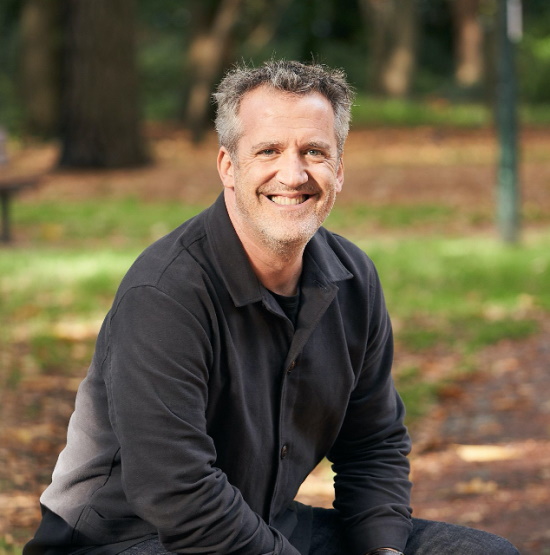2021-March-10
Did you know? You can share this story using the social media icons on the upper left. Use the hashtag #WeAreCisco. You can also rate or comment on the story below.
I have OCD but my desk is a mess
BY GILES HERON · PRINCIPAL ENGINEER · UNITED KINGDOM
WITH HELEN GALL
In many ways, my life today is great. I’m a Principal Engineer in the Emerging Technologies & Incubation group at Cisco, doing leading-edge engineering work, and living in the city that I adore above all others — London.
However, for most of my life, I’ve struggled with obsessive-compulsive disorder (OCD). It’s something I’ve shared with a relatively small circle of people.
Until now.

If. I. Could. Just. Get. This. To. Feel. Right.
OCD is a mental health disorder whereby unwanted, intrusive thoughts (“obsessions”) cause intense anxiety that provokes repetitive behaviours (“compulsions”) in an attempt to alleviate the distress. While effective in the very short term, the compulsive behaviours reinforce the faulty meaning ascribed to the original intrusive thoughts, feeding a vicious cycle that can be physically and emotionally debilitating.
This differs sharply from the pop culture references that portray OCD as a humorous quirk or a synonym for extreme attention to detail. It is neither. And as for Khloé Kardashian‘s claim that her (supposed) OCD is a blessing?
Hmmm, let’s see:
- Is it a blessing to take hours to leave the house because you’re constantly checking and re-checking that all the electrical appliances are switched off and unplugged?
- Is it a blessing to drive back-and-forth along a stretch of road to ensure there are no dead bodies?
- Is it a blessing to lie awake until dawn ruminating about whether your fleeting comment during a Webex call was possibly misinterpreted?
I’ve done all of those things and more. Over and over and over and over and over again.
I Was Lonely. But Not Alone.
Of course, many of you know this first-hand. 1.6 percent of the world’s population are believed to suffer from OCD. It cuts across every demographic, culture, and religion, with around half of sufferers having severe impairment to their day-to-day lives.
For me, OCD began gradually impacting my life when I was a child. It grew increasingly difficult over the years and became unbearable when I was 15, causing me to drop out of school and cut myself off from my friends.
A year later, I returned to education, though my OCD persisted. I rarely attended classes and struggled with feelings of intense loneliness and shame.
Sadly, none of the many mental health professionals I saw in my teens diagnosed my problems as being OCD. Various other labels were used instead — agoraphobia, panic attacks, social anxiety, and so on — and the treatment offered was entirely ineffective.
The Only Way is Up
Somehow, in spite of my struggles, I obtained the grades needed to go to a good university. However, by my second year there, my condition had worsened as I began to experience crippling fears about the safety of myself and others.
These fears led me to wash my hands repeatedly, perform mental counting rituals, and constantly ask medical professionals and my family members for reassurance in a desperate (and ultimately futile) attempt to calm the sheer existential terror in my mind.
Fortunately, around that time, I read a newspaper article about OCD, which gave a name to my affliction. “OCD. I have that,” I thought. This is what’s controlling my life. It’s concrete; definable. And according to the article, treatable.
Finally, I was able to find help for my OCD in the form of “Exposure and Response Prevention”. It’s a form of therapy where you deliberately trigger your anxiety but don’t respond with compulsive behaviours. It’s a very effective treatment, but about as much fun as having a tooth removed without anaesthetic!
Not Perfect. But That’s OK.
Since then, my life has had more ups than downs. And according to the diagnostic YBOCS (Yale-Brown OCD Scale), my current score is about 8/40, or very mild OCD. At its peak, I would have been well over 30 (extreme OCD) and was so anxious I couldn’t eat, barely slept, and never left my home.
During my decade at Cisco, I’ve experienced a couple of difficult times with my OCD, during which my line managers were very supportive. For example, during one period of several months, travel became very difficult for me, and my manager found workarounds that enabled me to remain at home. (Which is not easy or ideal in a job like mine!)
Let’s Put Our Heads Together
In my spare time, and with Cisco’s support through Time2Give, I help run the Central London OCD Support Group. It’s not possible to meet in person right now, but around 50 people attend our weekly Webex meetings.
There’s something almost magical about hearing someone talk about their OCD for the first time, only for them to discover that someone else in the group has experienced — or is experiencing — the exact same thoughts and fears.
Related Links
Connect everything. Innovate everywhere. Benefit everyone.
Share your thoughts!
Log in to rate and commentShare your thoughts on the story here!